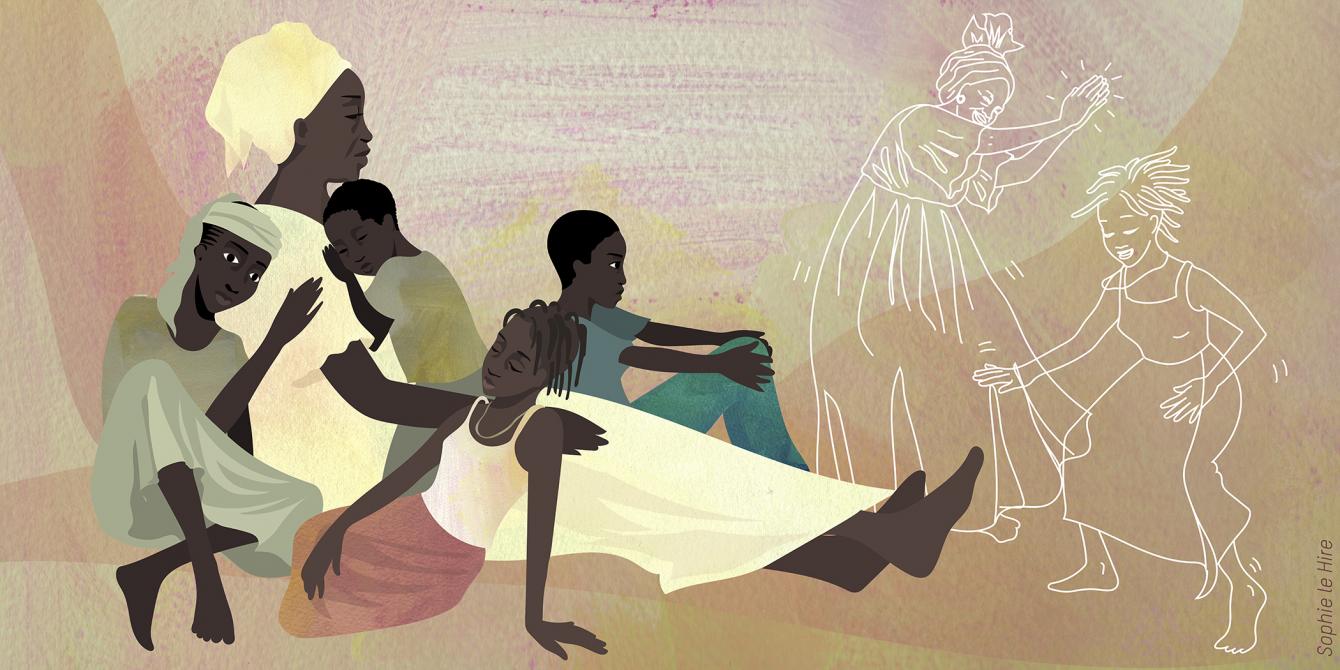The Day We Will Dance: Victorine in Burkina Faso

The series The Day We Will Dance is illustrated by the artist Sophie Le Hire
My name is Victorine*. I come from the Center-North of Burkina, from the village of Dablo. Before, I used to make a traditional millet beer as part of a women's association. It allowed me to support my whole family. I have been the head of my large family since the death of my husband.
The first time that gunmen attacked my village, I lost two of my brothers and my nephew. The second time, I was forced to flee like others had done before me. I left with only the clothes that I was wearing; today I am left with nothing.
We are hosted, like so many others, by a local family. We did not know our host before we arrived. He is our benefactor; without him, I don’t know what we would have done. There’s a huge lack of food; I can't eat every day, and without help, I would not make it.
We have been told about coronavirus. It doubled our fear. You know, we fled because of the shootings and now we have more problems. When we arrived here [in Kaya], things seemed to have improved. We were able to go out to find food. Now, with COVID-19 added to them mix? it's a double fear. Can we deny that death is waiting for us now?
We can no longer gather for food distributions. We’re asked to wait for a phone call, but this is very slow. I’ve started to collect gravel, and I sell the heaps of gravel in order to feed my family. My children count on me.
The most difficult thing here is water – we urgently need it. When I get 10 cans of water, they don’t last the day; it's hot, we have to wash, drink, and clean. Water is our number one need.
If the disease ends and the attacks end, there will be peace. From childhood, our parents have always taught us that if there is agreement between a man and his wife, they make blessed children. As a woman, I teach my daughters-in-law, my children, my grandchildren, so that they cultivate peace and social cohesion. I would have liked to have been an outreach worker. I would go around to educate young people and women on the importance of peace.
In the future, I see myself surrounded by my children. They will have succeeded in school, they will take me on trips to visit other countries, and I will breathe the air of peace. My children are my hope because they are the source of my life. And with them, I will be happy. They say that a good child is everyone's child, so it all starts with education.
I ask the authorities to find a cure for the disease because we are already bearing the brunt of our other ‘disease’: insecurity.
Interview by Syntyche Ouedraogo, Oxfam in Burkina Faso.
*Name has been changed to protect the identity.
More stories from The Day We Will Dance
Read the story of Mariam* in Burkina Faso
"Behind us, there are attacks, in front of us is the disease. How will we cope?"
*Name has been changed to protect the identity.
Read the story of Halima in Niger
“Pregnant women kept falling and getting up. We have lost sight of our children."
Read the story of Tedy in Mali
Read the story of Sylvie in the Central African Republic
Read the story of Rosalie the Central African Republic
"The coronavirus scares me, but it's not going to last forever. I remain confident."
Introduction and creative process
Your donation will be processed through another Oxfam website. Please refer to their policies if you want to find out more about how your data will be handled.







 Follow us on Facebook
Follow us on Facebook Our videos on YouTube
Our videos on YouTube Follow us on Twitter
Follow us on Twitter